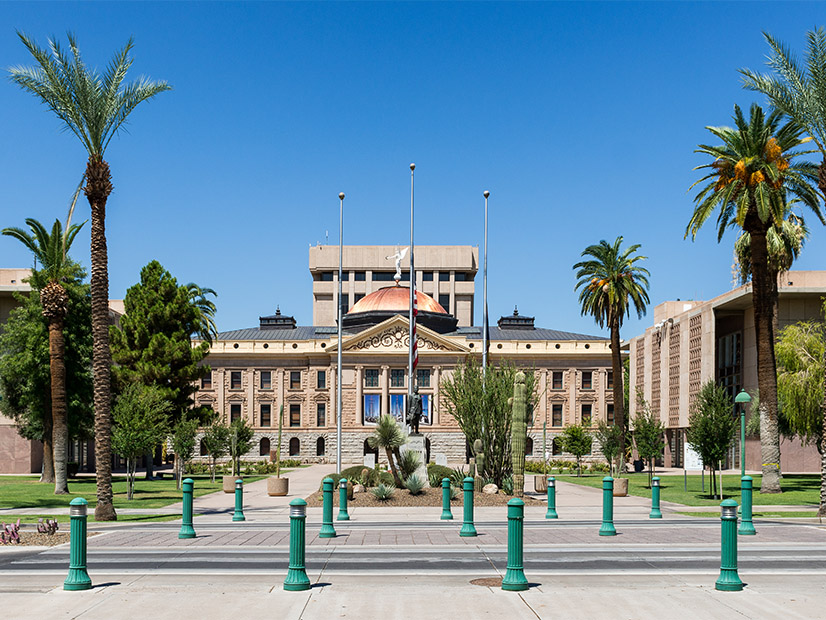A bill that would close the door to electric retail competition in Arizona has hit a snag in the state legislature.
House Bill 2101 sponsored by Rep. Gail Griffin (R) cleared two committees but failed 26-29 on the House floor on Feb. 14. Lawmakers approved a motion from Rep. Andres Cano (D) to reconsider the bill within 14 days. As of Tuesday, the bill hadn’t been voted on again.
HB 2101 would repeal a 1998 law that was intended to give customers a choice of electricity service providers in the service territories of both investor-owned utilities and consumer-owned “public power entities” (PPEs).
But the competition envisioned by the law never materialized. Although the Arizona Corporation Commission (ACC) adopted rules to allow competition, the rules were shot down by a 2004 appellate court ruling.
Now, proponents of HB 2101 say competition should be rejected to maintain reliable electric service.
During a committee hearing last month, many bill supporters cited the February 2021 winter storm in Texas that left millions of residents without power for days in subfreezing temperatures and contributed to the deaths of more than 200 people. Customers have retail electric choice in much of Texas.
“I’m not ready to gamble on a company that may not have a smart group of implementers,” said Rep. Teresa Martinez (R), a member of the House Committee on Natural Resources, Energy and Water. “We’re literally playing with people’s lives when it comes to water and energy.”
Others expressed concerns that allowing competition would lead to “cherry picking” of lucrative accounts.
With competition, Arizona’s existing utilities would serve as providers of last resort, being left to serve the costliest customers, said Molly Greene, senior director of state and local government relations for Salt River Project. The Tempe-based PPE with more than 1 million customers supports HB 2101, Greene said.
“The bill protects customers by eliminating the antiquated, defunct provisions that were contemplated a quarter century ago and never materialized,” Greene said.
Clean Energy Offerings
But Travis Kavulla, vice president of regulatory affairs for NRG Energy Inc., said there would be safeguards to protect customers in the event of electric competition in Arizona. NRG is an energy producer and retailer, as well as the parent company of Green Mountain Energy, which wants to do business in the state. HB 2101 would cut off that opportunity, Kavulla said.
NRG customers continue to pay utilities’ rates for upkeep of the grid, Kavulla said. In addition, Arizona customers would pay a “standby fee” for utilities’ prior investments in generation.
“Monopolies don’t like to be competed against, and in my experience they will do or say anything to deprive their customers of a choice in provider,” Kavulla said in written testimony to the committee.
Green Mountain Energy provides customers with 100% renewable energy. In contrast, Kavulla said, Arizona’s monopoly utilities have lagged in providing renewable energy.
The House NREW committee passed HB 2101 on a 10-2 vote on Jan. 18. The House Rules Committee then voted 8-0 in favor of the bill on Feb. 7.
Meanwhile, a companion bill in the Senate, SB 1631, was passed Feb. 16 by the Senate Committee on Natural Resources, Energy and Water on a 5-4 vote.
Green Mountain Application
Green Mountain Energy submitted an application to ACC in August to provide competitive electric generation services within the territories of the state’s largest investor-owned electric utilities, Arizona Public Service Co. and Tucson Electric Power Co.
Green Mountain Energy is licensed to provide electric service in 11 states, according to the application.
In its application, Green Mountain said it would offer annual fixed-price contracts to residential customers. Commercial and industrial customers would have a choice of fixed-price or indexed-price contracts. Green Mountain is asking the commission to approve a maximum price for the company’s electric generation services.
The application is on hold while the commission waits for an attorney general opinion on how to proceed.




